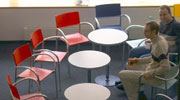
max planck institut
informatik
informatik



 |
 |
 |
Recent progress in Geometric Modeling has been stimulated by numerous applications in engineering and multimedia. The purpose of the course is to give an introduction to classical and modern mathematical techniques employed in Geometric Modeling and to demonstrate how these techniques are useful for the design and manufacture of engineering objects of high quality, entertainment and multimedia applications. The course will also serve as a starting point for those students who wish to use Geometric Modeling concepts and ideas in their own research. Topics to be covered include shape interpolation and approximation with piecewise polynomial curves and surfaces, curvature-based shape interrogation, mesh processing, and multiresolution modeling.
Content:
- Polynomial and Rational Curves
- Bezier, B-splines, NURBS
- Tensor Product Surfaces
- Shape Interrogation Methods
- Mesh Processing
- Surface Reconstruction from Scattered Data
Course Objectives:
- Learning working knowledge of theoretical and practical methods for solving geometric modeling problems on a computer.
Time and Place:
- Tuesday and Thursday, 2pm to 4pm
- HS II, Building E1.3
Instructors:
- Lecturers: Hans-Peter Seidel and Alexander Belyaev
- Teaching Assistants: N.N.
Exercise courses:
- on agreement
Grading policy:
- Weekly Assignments (40%)
- Mid-term Exam (20%)
- Final Exam (40%)
Prerequisites:
- none
Remarks:
- Course Web Page
- The lectures will be given in English.
- Possible followups: seminars, specialized and advanced lectures, bachelor and master theses in computer graphics.
 |
 |
 |
This seminar covers a variety of topics in computer graphics relevant to current research. Each talk will be based on recent publications from leading international conferences and journals.
Time and Place:
- First meeting: 21.4.2006 (Friday), 1pm to 3pm, MPI Room 024
- Friday 1pm to 3pm, E1.1, Sem UG
Topics:
- Gernot Ziegler: Real-Time Consensus-Based Scene Reconstruction using Commodity Graphics Hardware
- Christian Theobalt: A Dual Light Stage
- Andreas Dietrich: Adaptive Frameless Rendering
- Martin Fuchs: Compression Techniques for Precomputed Radiance Transfer
- Jügen Gall: Light Waving
- Naveed Ahmed: Geometry videos: A new representation for 3D animations
- Natascha Sauber: Spatialized Transfer Functions
- Rafal Mantiuk: Image Contrast Enhancement in Gradient Domain
- Carsten Stoll: A Sketch-Based Interface for Detail-Preserving Mesh Editing
- Edilson de Aquiar: Carved Visual Hulls for Image-Based Modeling
- Zhao Dong: A Practical Analytic Single Scattering Model for Real Time Rendering
- Heiko Friedrich: Ray Tracing Deformable Scenes using Dynamic Bounding Volume Hierarchies
- Philipp Slusallek: Guided Visibility Sampling
- Philipp Slusallek: Multidimensional Lightcuts
- Alexander Belyaev: Automatic Selection of Good Views of a 3D Object
- Alexander Belyaev: Generalized barycentric coordinates and their applications
Schedule:
Discussion Presentation Topic Presented by 5.5.2006 Ray Tracing Deformable Scenes using Dynamic Bounding Volume Hierarchies Ralf Karrenberg 12.5.2006 Spatialized Transfer Functions Markus Müller 19.5.2006 Multidimensional Lightcuts Ilyian Georgiev 2.6.2006 Mesh Saliency Wang Yan 9.6.2006 Image Contrast Enhancement in Gradient Domain: Wenxiang Wilson Ying Material:
Instructors:
Format:
- discussion of one paper per week
- all students must read the paper and prepare a 1/2 to 1 page summary
- block of presentations (1-2 full days) at end of semester
Grading policy:
- participation in class
- discussion with advisor (yes, you're allowed to ask questions ;-)
- final presentation in class (30 min talk, 15 min questions)
- written report on presented papers
Prerequisites:
- basic knowledge of Computer Graphics
Remarks:
- the seminar will be held in English
- possible followups: diploma, master, or bachelor thesis, FoPra, HiWi job